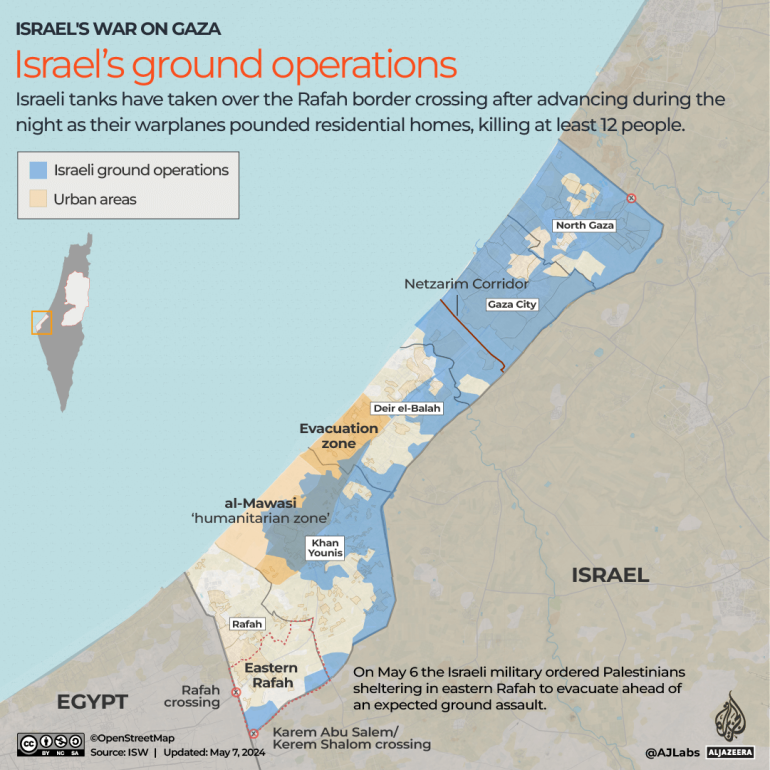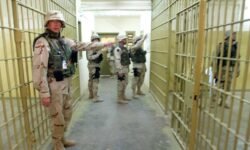
The Israeli military has seized control of the Gaza Strip side of the Rafah border crossing with Egypt, moving forward with an offensive in the southern city as prospects for a ceasefire deal with Hamas hang in the balance.
Israel’s 401st Brigade entered the Rafah crossing on Tuesday morning, a day after the Palestinian group governing Gaza said it accepted an Egyptian-Qatari mediated ceasefire proposal. Israel, meanwhile, insisted the deal did not meet its core demands.
The Rafah crossing is crucial for both aid and those able to flee into Egypt. Israeli leaders long anticipated a military operation into the southern city, where some 1.4 million Palestinians, including more than 600,000 children, are sheltering, despite warnings from the United Nations, United States, the European Union and international humanitarian organisations that an attack would be catastrophic.
What’s the status on the ground in Rafah?
Footage released by the Israeli military showed a tank entering the Palestinian side of the Rafah crossing. Details of the video matched known features of the crossing and showed Israeli flags flying from tanks that seized the area.
The Israeli military said in an early morning news briefing on Tuesday that its special forces were scanning the area and that they had been operating since Monday night in eastern Rafah.

Israel said the vast majority of people were evacuated from the area of military operations. Palestinians were instructed by Arabic text messages, phone calls and flyers to move towards al-Mawasi on the Mediterranean Sea coast, where the military said it had set up a humanitarian zone with field hospitals, tents and medical supplies.
The evacuations came as the Israeli military intensified its bombardment of the city. Tanks and planes pounded several areas and at least four houses in Rafah overnight, killing 20 Palestinians and wounding several others, according to Palestinian health officials.
Three people were killed in an Israeli air attack on a house belonging to the al-Darbi family west of Rafah city, Al Jazeera Arabic reported.
What are the reactions to the offensive?
The Israeli military claimed it seized the Rafah crossing after receiving intelligence it was “being used for terrorist purposes”. It said that in addition to killing 20 fighters and destroying Hamas infrastructure in the area, its forces also located “three operational shafts”.
“The forces of the 401st Divisional Combat Team and the Divisional Combat Team of the Givati Brigade continue to operate in the area against terrorists and terrorist infrastructures,” it said in a post on X.
No evidence was immediately provided to support the assertion, but the military alleged the area around the Rafah crossing was used to launch a mortar attack that killed three Israeli troops and wounded others near the Karem Abu Salem crossing, which Israel calls the Kerem Shalom crossing, on Sunday. Hamas’s armed wing has claimed responsibility for the attack.
Israeli Foreign Minister Israel Katz said his country would have “crushed” Hamas a long time ago if it was not for the captives held in Gaza. “The army’s entry into Rafah promotes the two main goals of the war: Freeing captives and defeating Hamas,” he said on X.
Chinese Foreign Ministry spokesperson Lin Jian called on Israel to “heed the overwhelming demands of the international community, stop attacking Rafah, and do everything it can to avoid a more serious humanitarian disaster in the Gaza Strip”.
Jordan’s Foreign Minister Ayman Safadi warned that Israel is “jeopardising the deal [with Hamas] by bombing Rafah”.
Jordan’s King Abdullah II told US President Joe Biden in a private meeting on Monday that an Israeli offensive in Rafah would lead to a “new massacre” of Palestinian civilians and could cause a regional spillover of the conflict.

What about the ceasefire deal Hamas agreed to?
Hamas on Monday said it had accepted a ceasefire proposal put forward by Egypt and Qatar that would see an initial halt in the fighting leading to lasting calm and the withdrawal of Israeli troops from the Palestinian territory.
The proposed agreement would also ensure the release of Israeli captives in Gaza as well as an unspecified number of Palestinians held in Israeli jails.
The Israeli prime minister’s office released a statement saying that the “Hamas proposal is far from Israel’s requirements”, but it will send a delegation to Cairo to continue negotiations.
The statement added that Israel will “continue the operation in Rafah to exert military pressure on Hamas”.
Families of captives in Gaza held demonstrations to pressure the Israeli government to accept the deal and return their loved ones home.
US State Department spokesman Matthew Miller said Washington would discuss the Hamas response with its allies in the coming hours, and a deal was “absolutely achievable”.
UN Secretary-General Antonio Guterres described the prospect of a ground invasion of Rafah as “intolerable” and called on Israel and Hamas “to go an extra mile” to reach a truce deal.
“This is an opportunity that cannot be missed, and a ground invasion in Rafah would be intolerable because of its devastating humanitarian consequences, and because of its destabilising impact in the region,” Guterres said on Monday, ahead of a meeting with Italian President Sergio Mattarella in New York.
What does this mean for aid deliveries into Gaza?
The Gaza Strip is now sealed off from the rest of the region. Shipments of crucial aid supplies to Gaza through the Rafah border crossing have been halted, despite the UN warning of a looming famine.
Gaza’s southern border with Egypt has been the main lifeline for the delivery of humanitarian aid and the only exit point for injured people and foreign passport holders.
Although Israel does not directly control the Rafah crossing, it monitors all activity in southern Gaza via its military bases and other surveillance.
The Israeli military has also closed the Karem Abu Salem (Kerem Shalom) crossing in southern Israel on Tuesday for “security reasons” and said it would reopen once the situation allows.

Hisham Edwan, spokesman for the Gaza Border Crossing Authority, said Israel had “sentenced the residents of the Strip to death after closure of the Rafah border crossing”. He said the situation was especially grave for cancer patients who need treatment.
World Food Programme Executive Director Cindy McCain on Sunday warned that the “full-blown famine” that took hold in the north of the enclave was “moving its way south”.
The UN agency for Palestinian refugees (UNRWA) said in a post on X that “the catastrophic hunger faced by people” in Gaza would “get much worse” if supply routes were interrupted.
Sam Rose, director of planning at the UNRWA, told Al Jazeera that Israel’s push to close the Rafah crossing and the Karem Abu Salem (Kerem Shalom) crossing “cuts off everything”.
“There’s no ability for desalination plants to operate and provide safe water. There’s no electricity,” Rose said.
As the occupying power, Israel is obliged under international law to ensure the provision of food and medical care to the population and to facilitate the work of humanitarian organisations delivering aid.
EMEA Tribune is not involved in this news article, it is taken from our partners and or from the News Agencies. Copyright and Credit go to the News Agencies, email news@emeatribune.com Follow our WhatsApp verified Channel









